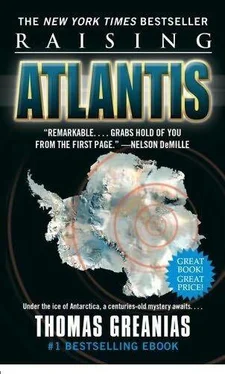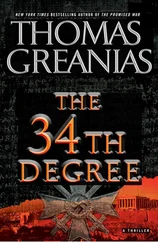“I saw a beautiful rose frozen in ice,” the pope said. “And then the ice cracked, and out of the crack came fire and a war waged by the sons of God against the Church and all mankind. In the end the ice melted and tears rolled off the petals of the rose.”
Serena recalled the sixth chapter of Genesis, which said that the “sons of God” ruled the Earth in an ancient epoch of time. Their offspring, born of women, did so much evil that God destroyed them and the entire human race in the Great Flood, save for Noah and his family. But Serena also recalled that apocalyptic visions, whether from the Bible or from the mouths of young Portuguese shepherds, do not detail the future in high-definition clarity. Instead they synthesize it and set it against a unified, timeless backdrop of symbols that require interpretation.
“So Your Holiness feels that this vision, the myth of Atlantis, and the current American military activities in Antarctica are altogether one and the same?”
“Yes.”
She tried to mask her doubt, but each element alone strained credulity. “I see.”
“No, you don’t,” he said. “Look closer.” The pope held a rolled-up parchment in his hand. “This is one of the source maps we believe Admiral Reis used. The map, really.”
Serena slowly reached forward and took the map from the pope’s hand. As soon as she clutched it in her own, she felt a jolt of anticipation surge through her veins.
“It has Sonchis’s name on it,” the pope said. “But the rest of the writing is pre-Minoan.”
She said, “Give me a few weeks and-”
“I was hoping you could decode it on the way to Antarctica,” the pope said. “I have a private jet fueling up on the runway for your journey.”
“My journey?” Serena said. “You said it yourself, Your Holiness. This city, if it truly exists, is buried under two miles of ice. It might as well be on Mars.”
“The Americans have found it,” the pope insisted. “Now you must find them. Before it is too late.”
The pope placed one hand on the terrestrial globe to his right and the other on the celestial globe to his left.
“These globes were painted by Dutch master cartographer Willem Bleau in 1648,” he said. “At the time they, too, displayed the ‘modern world.’ Unfortunately, they depict an entirely wrong version of the planet and the heavens. Look, California is an island.”
She looked at the terrestrial globe and saw monsters in the sea. “I’m familiar with Bleau’s work, Your Holiness.”
“What everybody once thought was true is false,” he replied. “A warning that the way we see the world today will probably look equally wrong a few centuries hence. Or a few days.”
“A few days?” Serena repeated. “Your prophecy is to be fulfilled within a few days and you have not revealed it to the Church?”
“There are bitter spiritual, political, and military implications, Sister Serghetti,” the pope said, continuing to address her as a nun, a member of the family, and not an outsider. “Just consider what would happen should moral anarchy reign on Earth because humanity has cast aside the Judeo-Christian tradition.”
“I have, Your Holiness, and that day came a long time ago to the rest of the world outside Rome.”
The pope said nothing for an uncomfortable minute. Finally, he cleared his throat and said, “Have you ever wondered why you chose to join such a secure and predictable surrogate family as the Church?”
Serena remained silent. It was a question she took pains to avoid asking herself. The truth was that despite her public differences with it, she believed the Church was the hope of humanity, the only institution that kept an amoral world from spinning out of control.
“Perhaps because as a nun you felt it would be easy for you to be right with God,” the pope said. “Perhaps because you desperately needed to know beyond a shadow of a doubt that you were acceptable to him.”
The pope was probing so close to the truth that it was almost too unbearable for Serena to remain in the room. She wanted to run away and hide.
“It’s not by my good deeds but by God’s mercy through Christ’s atoning death on the cross that my immortal soul is saved, Your Holiness.”
“My point exactly,” the pope said. “What more do you hope to add?”
Serena could feel the emptiness inside her like a dull ache. She had no answer for the pope but wanted to say something, anything. “Banishing me to Antarctica to expose the Americans isn’t going to-”
“Finally make you worthy of your calling as Mother Earth?” The pope looked at her like a father would his daughter. “Sister Serghetti, I want you to go to nature’s ‘last wilderness’ and find God-away from all this.” He gestured to the books and maps and works of art. “Just you and the Creator of the universe. And Doctor Yeats.”
Discovery Plus Twenty-Three Days, Six Hours
Ice Base Orion
The command center of Ice Base Orion was a low-ceilinged module crammed with consoles and crew members watching their flickering monitors in the shadows. But to Major General Griffin Yeats it was a triumph of Air Force logistics, erected in less than three weeks in the most alien terrain on planet Earth.
“Thirty seconds, General Yeats,” said Colonel O’Dell, Yeats’s neckless executive officer, from the shadows of his glowing console.
An image of Antarctica hovered on the main screen. The ice-covered continent was an eerie blue from the vantage point of space, a great island surrounded by a world ocean and an outer ring of landmass, the navel of the Earth.
Yeats stared at the screen incredulously. He had seen that very picture of the Southern Hemisphere once before, from the window of an Apollo spacecraft. That was almost a lifetime ago. Still, some things never changed, and a sense of awe washed over him.
“Satellite in range in fifteen seconds, sir,” O’Dell said.
The video image blurred for a moment. Then a gigantic storm cloud jumped into view. Yeats saw what looked like the legs of a spider swirling clockwise around Antarctica. There were twelve of these legs or “strings of pearls”-low-pressure fronts endemic to the region.
“That’s one hell of a storm,” Yeats said. “Give me the specs.”
“Looks like we’ve got four separate storms merging into a double-low, sir,” O’Dell reported. “Almost four thousand miles wide. Big enough to cover the entire United States.”
Yeats nodded. “I want the runway cleared again.”
The room got quiet, only the low hum and soft beeps of the computers and monitors. Yeats was aware of the stares of his officers.
O’Dell cleared his throat. “Sir, we should warn six-nine-six.”
“Negative. I want radio blackout.”
“But, sir, your-Doctor Yeats is on board.”
“We’ve got forty men on that transport, Colonel. And a fine pilot in Commander Lundstrom. No transmissions. Buzz me on their approach.”
“Yes, sir,” said O’Dell with a salute as Yeats marched out of the command center.
The floor-to-ceiling window in General Yeats’s quarters framed the yawning ice gorge outside, offering him a skybox seat of the excavation. Pillars of bluish, crystal plumes billowed out of the abyss. And at the bottom was everything he and Conrad had been searching for.
Yeats poured himself a Jack Daniel’s and sat down behind his desk. He hurt like hell and wanted to howl like the katabatic winds outside. But he couldn’t afford to let O’Dell or the others see him at less than his best.
He propped his right boot on the desk and pulled his pant leg back to reveal a scarred and disfigured limb, his parting gift from his first mission to this frozen hell more than thirty-five years ago. The pain throbbed a few inches below the knee. Goddamn tricks the cold played on him down here.
Читать дальше












